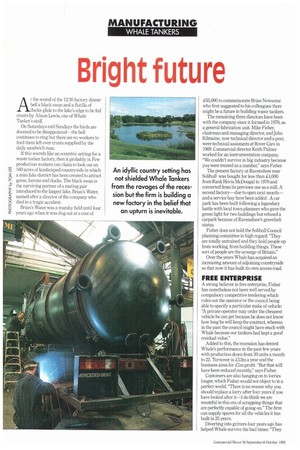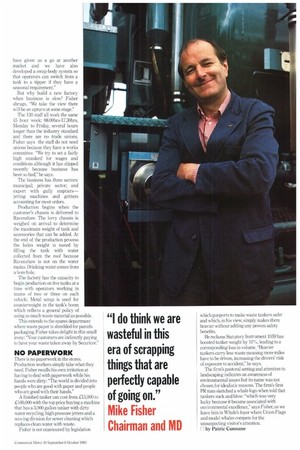Bright future
Page 42

Page 43

If you've noticed an error in this article please click here to report it so we can fix it.
A, the sound of the 12:30 factory dinner bell a black swan and a flotilla of ducks glide to the lake's edge to be fed crusts by Alison Lewis, one of Whale Tanker's staff.
On Saturdays and Sundays the birds are doomed to be disappointed—the bell continues to ring but there are no workers to feed them left-over crusts supplied by the daily sandwich man.
If this sounds like an eccentric setting for a waste tanker factory, then it probably is. Few
production workers can claim to look out on 11,2A 160 acres of landscaped countryside in which 6 a mini lake district has been created to attract Fgeese, herons and ducks. The black swan is
>.. -° the surviving partner of a mating pair >. i introduced to the largest lake, Brian's Water,
named after a director of the company who 8 died in a tragic accident. b Brian's Water was a marshy field until four 1 years ago when it was dug out at a cost of
£65,000 to commemorate Brian Newsome who first suggested to his colleagues there might be a future in building waste tankers.
The remaining three directors have been with the company since it formed in 1970, as a general fabrication unit. Mike Fisher, chairman and managing director, and John Kilmaine, now technical director and a peer, were technical assistants at Rover Cars in 1969. Commercial director Keith Palmer worked for an instrumentation company. "We couldn't survive in big industry because you were treated as a number," says Fisher.
The present factory at Ravenshaw near Solihull was bought for less than £4,000 from Rank Hovis McDougal in 1970 and converted from its previous use as a mill. A second factory—due to open next month— and a service bay have been added. A car park has been built following a legendary battle with local town planners who gave the green light for two buildings but refused a carpark because of Ravenshaw's greenbelt status.
Fisher does not hold the Solihull Council planning committee in high regard: "They are totally untrained and they hold people up from working, from building things. These sort of people are the scourge of Britain."
Over the years Whale has acquired an increasing amount of adjoining countryside so that now it has built its own access road.
FREE ENTERPRISE
A strong believer in free enterprise, Fisher has nonetheless not been well served by compulsory competitive tendering which rules out the operator or the council being able to specify a particular make of vehicle: "A private operator may order the cheapest vehicle he can get because he does not know how long he will keep the contact, whereas in the past the council might have stuck with Whale because our tankers had kept a good residual value."
Added to this, the recession has dented Whale's performance in the past few years with production down from 30 units a month to 22. Turnover is £12m a year and the business aims for Lim profit. "But that will have been reduced recently," says Fisher.
Customers are also hanging on to lorries longer, which Fisher would not object to in a perfect world. "There is no reason why you should replace a lorry after four years if you have looked after it—I do think we are wasteful in this era of scrapping things that are perfectly capable of going on." The firm can supply spares for all the vehicles it has built in 25 years.
Diverting into gritters four years ago has helped Whale survive the bad times: "They have given us a go at another market and we have also developed a swap-body system so that operators can switch from a tank to a tipper if they have a seasonal requirement."
But why build a new factory when business is slow? Fisher shrugs, "We take the view there will be an upturn at some stage."
The 130 staff all work the same 45 hour week: 08.00hrs-17.30hrs, Monday to Friday, several hours longer than the industry standard and there are no trade unions. Fisher says the staff do not need unions because they have a works committee, "We try to set a fairly high standard for wages and conditions although it has slipped recently because business has been so bad," he says.
The business has three sectors: municipal; private sector; and export with gully emptiersjetting machines and gritters accounting for most orders.
Production begins when the customer's chassis is delivered to Ravenshaw. The lorry chassis is weighed on arrival to determine the maximum weight of tank and accessories that can be added. At the end of the production process the laden weight is tested by filling the tank with water collected from the roof because Ravenshaw is not on the water mains. Drinking water comes from a bore hole.
The factory has the capacity to begin production on five tanks at a time with operators working in teams of two or three on each vehicle. Metal scrap is used for counterweight in the tank's boom which reflects a general policy of using as much waste material as possible.
This extends to the spares department where waste paper is shredded for parcels packaging. Fisher takes delight in this small irony: "Your customers are indirectly paying to have your waste taken away by Securicor."
NO PAPERWORK
There is no paperwork in the stores. Production workers simply take what they need. Fisher recalls his own irritation at having to deal with paperwork while his hands were dirty: "The world is divided into people who are good with paper and people who are good with their hands."
A finished tanker can cost from .C15,000 to £160,000 with the top price buying a machine that has a 3,000 gallon tanker with dirty water recycling, high pressure jetters and a moving division for sewer cleaning which replaces clean water with waste.
Fisher is not enamoured by legislation which purports to make waste tankers safer and which, in his view, simply makes them heavier without adding any proven safety benefits.
He reckons Statutory Instrument 1059 has boosted tanker weight by 10%, leading to a corresponding loss in volume. "Heavier tankers carry less waste meaning more miles have to be driven, increasing the drivers' risk of exposure to accident," he says.
The firm's pastoral setting and attention to landscaping indicates an awareness of environmental issues but its name was not chosen for idealistic reasons. The firm's first PR man sketched a whale logo when told that tankers suck and blow: "which was very lucky because it became associated with environmental excellence," says Fisher, as we leave him in Whale's foyer where Union Flags and model whales compete for the unsuspecting visitor's attention.
1-1 by Patric Cunnane
























































































